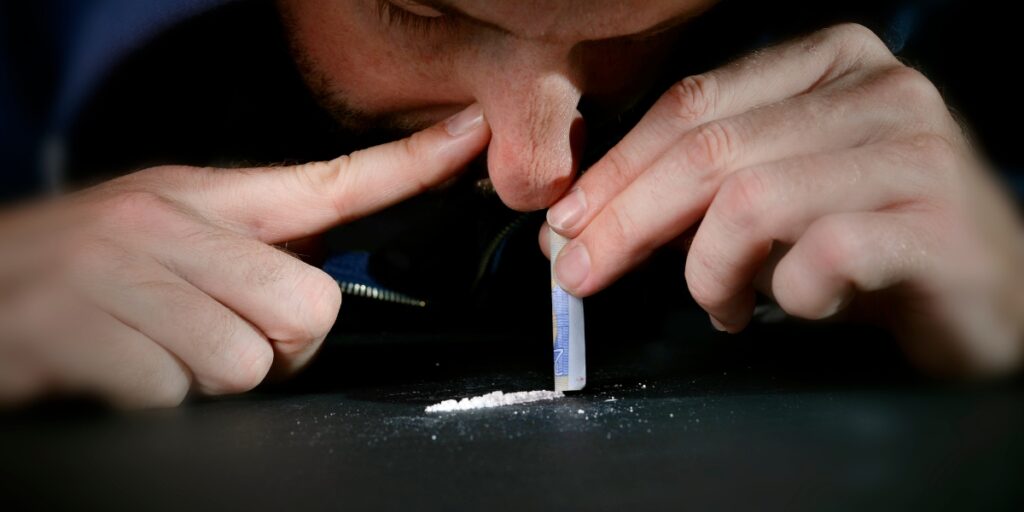Cocaine and ADHD

The general population of the United States has many people struggling with cocaine addiction and attention deficit hyperactivity disorder (ADHD).
Some people initially turned to cocaine after realizing that it can briefly have the same effect as prescription stimulant medications or use it to supplement their ADHD meds. However, those effects are brief and quickly lead to more dangerous side effects and addiction.
Medical professionals use the Diagnostical and Statistical Manual of Mental Disorders, now in its fifth edition, or the DSM-5, to diagnose psychiatric disorders, including ADHD and substance use disorders, and their appropriate treatments. One or more diagnosed mental health conditions are called co-occurring disorders; ADHD is one of the most common alongside substance use disorders.
According to National Institute on Drug Abuse (NIDA) data, 25% of people seeking addiction treatment meet the diagnostic criteria for a substance use disorder and ADHD.
Studies have revealed that children given ADHD medication were twice as likely to develop a cocaine addiction later in life. Approximately 6.4 million children in the United States are taking prescription stimulants for ADHD, indicating that cocaine addiction rates will continue to rise.
What Is Cocaine?
Cocaine is a highly addictive, illegal stimulant drug derived from the coca plant. It is a fine, white, or off-white powder that people snort, smoke, or inject. Crack is cooked-down cocaine people smoke for a more intense, cheaper high.
In the United States, cocaine and crack are Schedule II controlled substances because of their high abuse potential.
In the brain, cocaine interacts with dopamine receptors, causing a release of the so-called “feel-good chemical” that causes feelings of pleasure and reward. Cocaine also causes dopamine to stay in the system longer than usual.
The body metabolizes cocaine quickly, meaning the effects are short-lived, and cocaine users need continuous hits to maintain their high. Cocaine stays in your system even after the effects wear off, which can cause it to build up and lead to delayed side effects or an overdose.
Chronic cocaine abuse, whether a bender over a couple of days or ingesting it daily, has an extremely high risk of developing cocaine use disorder and other unpleasant side effects.
Why Do Stimulants Calm ADHD?
The reason that stimulants work to calm ADHD and help people with ADHD manage their symptoms is because of their effect on dopamine and the central nervous system.
In a chemically balanced brain, dopamine is released, seeks out the proper brain structures, and performs its designated functions. In patients with ADHD and other psychiatric disorders caused by low dopamine, their body doesn’t produce enough dopamine and doesn’t correctly process what it does make.
Prescription ADHD medications like Adderall or Ritalin help to regulate by stimulating dopamine and effectively utilizing it.
While experts are still uncovering how ADHD affects the brain, they have discovered it mainly affects the prefrontal cortex. The prefrontal cortex (PFC), or frontal lobe, controls not only dopamine levels and interactions but also manages the following:
- Impulse control
- Decision making
- Focus
- Short-term memory
- Problem-solving
- Mood regulation
- Personality expression
When a person with ADHD takes stimulants, the resulting dopamine essentially calms down the overactive parts of the brain and allows them to focus and operate at a more normal pace. While cocaine is a stimulant and will briefly up dopamine, it isn’t the same as prescription medications, so it’s a short-term fix with long-term consequences.
How Does Cocaine Affect ADHD?
Because cocaine is a stimulant, it will temporarily affect ADHD symptoms and reduce them, acting almost like a sedative. However, with repeated and continuous cocaine use, people will develop tolerance, risk substance abuse problems, and worsen their adult ADHD.
Furthermore, there is a strong correlation between people with ADHD and self-medicating with substances, specifically stimulants. Researchers refer to this as relief craving because people with ADHD aren’t necessarily trying to get high but find something to ease their discomfort.
Patients with ADHD also have poor impulse control, making them more likely to use whatever is immediately available rather than being patient and seeking professional medical help. Receiving prescribed and monitored ADHD medications reduces the risk of substance abuse but does not eliminate it.
As previously mentioned, cocaine causes a rush of dopamine and pleasurable effects. Still, the resulting crash and damage to receptors in the brain cause a dopamine deficit that increases the symptoms of ADHD and causes additional withdrawal symptoms similar to ADHD.

Effects of Cocaine on ADHD
The immediate effects of cocaine on ADHD seem similar to other prescription ADHD medications and counterintuitive to what a stimulant should do because, as previously described, people with ADHD process dopamine differently.
The effects of cocaine on ADHD include:
- Increased focus
- Improved executive functioning
- Mood regulation
- Feelings of calm
- Tiredness
- Decreased fidgeting
Of course, these effects are very short-lived and only come from the initial doses of cocaine. As cocaine users with ADHD continue to use cocaine, eventually, they will experience the stimulation that everyone else does. However, the large amounts of coke needed to achieve a high come with dangerous short and long-term side effects.
Reacting differently to cocaine is not the same as having a tolerance. Feeling different effects than the average cocaine user does not prevent you from developing physical cocaine dependence, addiction, or experiencing an overdose.
Non-stimulant medications like Strattera for managing ADHD work by building up in the system to regulate a chemical called norepinephrine, which has similar effects to dopamine. These work like antidepressants and don’t cause stimulant effects, but they still have a high abuse potential. Additionally, studies have shown that non-stimulant medication for ADHD did little to reduce cocaine cravings in participants who had already developed an addiction.
Short-Term Cocaine Effects
The short-term effects of cocaine include physical and mental side effects that will vary based on the amount ingested, the physical and psychological makeup of the person taking it, and other substances used simultaneously.
Short-term effects of cocaine include:
- High blood pressure
- Increased heart rate
- Sensitivity to light and sound
- Bursts of energy
- Feelings of euphoria and confidence
- Dilated pupils
- Talkativeness
- Appetite loss
- Twitching
- Mood swings
- Anxiety
- Paranoia
- Nausea
- Vomiting
- Abdominal pain
- Reduced inhibitions
- Risky sexual behavior
- Cocaine psychosis
Most short-term effects of cocaine will resolve themselves as the drug leaves the system; however, some may lead to long-term complications. Illicit drugs, including cocaine, are frequently cut with other substances that can increase the risk of developing side effects or causing an overdose.
Long-Term Cocaine Effects
Long-term cocaine effects don’t necessarily take much time to occur, but they have long-lasting impacts that may require medical attention and, typically, an addiction treatment plan.
Long-term effects of cocaine include:
- Weightloss
- Malnutrition
- Drug cravings
- Coke nose
- Chronic respiratory infections
- Injected injection sites
- Kidney damage
- Bowel decay
- Sexual dysfunction
- Depression
- Anxiety
- Paranoia
- Suicidal thoughts
- Stroke
- Heart attack
- Withdrawal symptoms
Cocaine withdrawal is not life-threatening in the same way that opioid or alcohol withdrawal can be. Still, it has uncomfortable and intense mental and physical effects that may require outside help and support.
For people struggling with the combination of cocaine use disorder and ADHD, residential treatment specializing in cocaine abuse treatment and treating ADHD or other co-occurring disorders and substance use disorders is the best option.

Cocaine Use Disorder Treatment in Northridge, California
The first step in overcoming addiction and mental health disorders is getting a proper diagnosis and treatment plan personalized to your needs and long-term goals.
Northridge Addiction Treatment Center recognizes and treats substance use and co-occurring disorders with evidence-based treatments and therapies.
Our private residential treatment facility offers onsite medical detox with 24-hour medical care and a superior patient-to-counselor ratio to ensure you get the full attention and support you require for the entirety of your stay with us.
We use cognitive behavioral therapy and other techniques to manage your addiction triggers and attention hyperactive deficit disorder. Our individual therapy, guided group therapy sessions, and family therapy help you repair and build your support network and improve your communication skills.
We aim to uncover and address the roots of addiction while empowering you with knowledge, confidence, and skills to maintain a life-long recovery full of joy and healing.
Contact our treatment specialists to start your path to meaningful, lasting recovery.
Find Meaningful Recovery
Our caring and compassionate specialists are eager to help you comfortably navigate this journey to recovery. Our individualized treatment plan, programs, and therapies may be a perfect match for you or your loved one. Let us assist you in living the happy life you deserve. It starts with a phone call.




